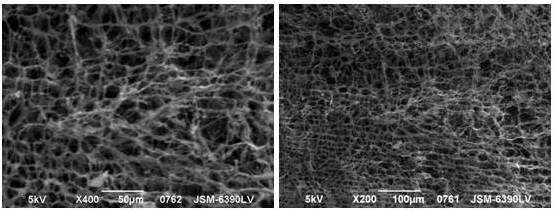A protein extracted from squid may help increase tissue growth for regenerative medicine

Scientists at Immanuel Kant Baltic Federal University have created a flexible and durable scaffolds for growing collagen protein-based cells, extracted from squid. The proposed material is chemically similar to mammalian proteins and is non-toxic, therefore contributing to fast adherence and division of human stem cell cultures. This development will help accelerate cell culture growth, which are used in medicine as a replacement for damaged tissue. The results of this study, supported with a grant of Russian Science Foundation (RSF), have been published in the Polymers magazine.
Collagen is the basic protein that makes up the intercellular matrix, or in other words, the environment for the connective tissue cells of our body, such as tendons, bone, and cartilage. It looks like long threads, woven into three-dimensional networks. This, in turn, creates a kind of a tissue scaffold. Due to the fact that collagen fibers are durable, elastic, and also serve as signals that determine the cell's so-called destiny, in medicine they are used as an environment to accelerate growth and differentiation of tissues, for example in wound healing. Most often such materials are artificially synthesized from collagen dissolution. However, even the most advanced technologies are unable to create collagen "networks" that exactly repeat the structure of a natural cellular environment, most favorable for its regeneration, or in other words, tissue repair.
Scientists from Immanuel Kant Baltic Federal University (Kaliningrad) with their colleagues from Voronezh State University (Voronezh) have proposed to use natural collagen extracted from Dosidicus gigas squid as tissue scaffold for growing cells instead of artificially synthesized collagen. This large marine animal is the most popular commercial species of squid that is used in cooking and also by scientists when studying animal brain and behavior. With regard to the availability and high volumes of Dosidicus gigas catch (up to 700 tons a year), this species may yet become a source of collagen for medical purposes on an industrial scale.
The authors have extracted collagen from the squid's skin, then the protein was blended with glycerin and water and dried in a special chamber, in order to shape it in the form of a scaffold. The durability and elasticity of the resulting fibrous material was then tested by stretching the sample. It turned out that the material's mechanical properties matched those already used as cell scaffolds in regenerative medicine. Analysis of amino acid sequence, which is part of the protein, has shown that the Dosidicus gigas collagen is similar to mammal collagen, making it possible to be used when working wit human cell cultures with no risk of rejection.
In order to experimentally prove that the squid scaffold is suitable for growing human cells, scientists have placed samples into small plastic nutrient-filled walls, and afterwards applied human stem cell cultures onto their surfaces.
Cell culture observation has shown that in four days the cells strongly bound to the collagen scaffold, forming a big network with each other. Besides that, cells began to actively interact with the substrate, transforming it and releasing extracellular matrix into the environment—molecules which play an important role in tissue restoration. The authors have also concluded that squid collagen has no toxic effect, since the median survival of cells that were cultivated there was 90%.
"The technology of creating collagen scaffolds of squid protein is quite simple, and therefore can be easily used at an industrial scale. The experiments have shown that our proposed material has high durability and elasticity, it is biocompatible, non-toxic, and also contributes to growth, division and migration of human embryonic cells. This suggests that it can be considered a promising replacement for synthetic collagen, currently used in modern regenerative medicine",—says Evgeny Chupakhin, associate professor of PSC "Institute of Medicine and Life Sciences" at Immanuel Kant Baltic Federal University.
The results of the work have already attracted the interest of the industry. For example, only one company, Varseas, produces collagen of the described type in Russia.
Provided by Immanuel Kant Baltic Federal University